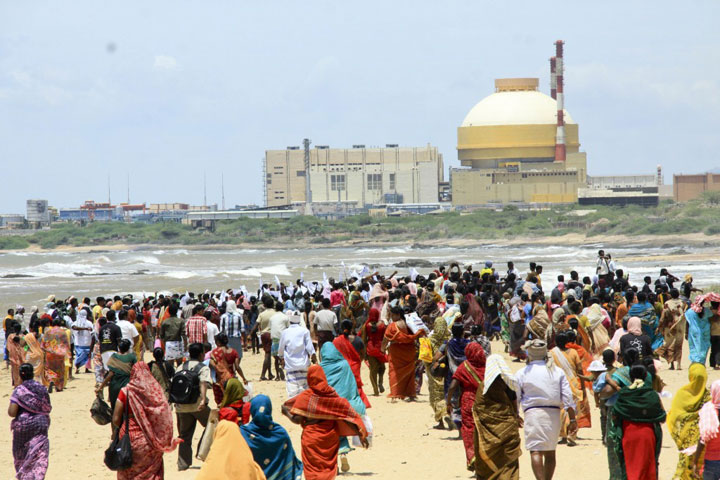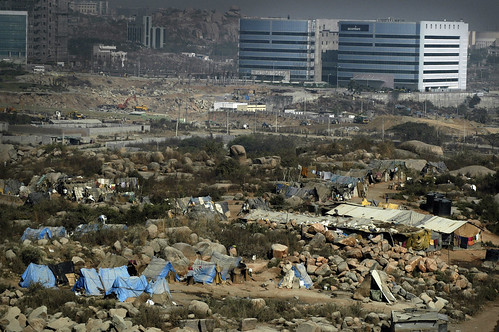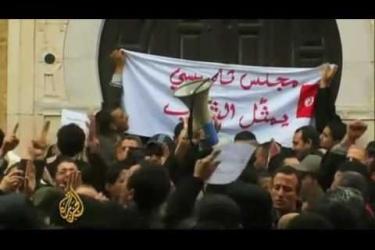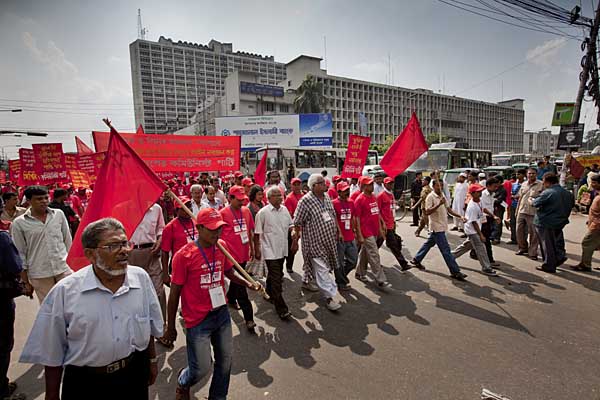India
BRICS bloc’s rising ‘sub-imperialism’: the latest threat to people and planet?

President Dilma Rousseff of Brazil, Russian President Dimitry Medvedev, India

More than 20,000 villagers protest at the Koodankulam Nuclear Power Plant on September 9, 2012. Photos from Countercurrents. More photos below.
Neeraj Jain interviewed by B. Skanthakumar
October 5, 2012 – Links International Journal of Socialist Renewal -- The anti-nuclear peoples’ movement in India has been gathering momentum in recent years. The courageous struggle of women, men and children of Idinthakarai village in South India, who are resisting the Koodankulam Nuclear Power Plant, and are under siege by state security forces – with more than 56,000 of whom have been falsely charged, including 6000 for the offence of “sedition”, and 53 imprisoned – has highlighted the people’s movement against nuclear energy.
The revolutionary legacy of Bhagat Singh: the 'Che Guevara' of South Asia

September 28, 2012, marked the 105th anniversary of the birth of South Asian revolutionary Bhagat
The dirty picture of neoliberalism: India’s New Economic Policy

Wealth and poverty in India.
Pakistan: The political context of a ‘religious’ assassination

Salmaan Taseer, assassinated governor of Punjab.
By Beena Sarwar
January 8, 2012 -- Links International Journal of Socialist Renewal, a longer version of this article will appear at Viewpoint -- Just over a year ago, Salmaan Taseer, governor of Pakistan’s largest province, the Punjab, was assassinated in the most cowardly manner by a government-assigned security guard in federal capital, Islamabad. The killer, a trained commando of the Punjab Elite Force, Mumtaz Qadri, pumped 27 bullets into the Governor’s back as he headed to his car on the afternoon of January 4, 2011.
This sensational murder rocked the nation and reverberated around the world. It was not a spontaneous enraged act but a well-thought out, cold-blooded plan. One man executed this plan – but was he acting alone and was it an act motivated only by "religious fervour" as has been depicted, or is there more to the issue than meets the eye? And even if the action was purely altruistic, should the law of the land not be applied to punish the guilty?
India: Walking with the comrades, by Arundhati Roy
March 22, 2010
A history of oppression: the Tamils of Sri Lanka

By Danielle Sabai
June 2, 2011 -- Asia Left Observer, posted at Links International Journal of Socialist Renewal with permission -- In February 2011, the president of Sri Lanka, Mahinda Rajapaksa, celebrated the 63rd anniversary of the island’s independence. In his speech, he stressed the necessity of “protecting the reconstructed nation”, as well as protecting “one of the oldest democracies in Asia”, its unity and its unitary character.
This speech came nearly two years after the end of the war on May 19, 2009, between the Sri Lankan state and the Liberation Tigers of Tamil Eelam (LTTE). The military command of the LTTE was decimated in the last two months of a merciless war that has had led to tens of thousands of deaths since the early 1980s.
West Bengal: Collapse of the Left Front government and the way ahead for India's left
West Bengal's defeated chief minister, the CPI (M)'s Buddhadeb Bhattacharjee, addresses a mass rally.
By Dipankar Bhattacharya, general secretary, Communist Party of India (Marxist-Leninist) Liberation
[This article is the editorial in the forthcoming June 2011 issue of the CPI (ML) Liberation's journal Liberation. It is posted at Links International Journal of Socialist Renewal with permission.]
Osama bin Laden is dead – but US imperialism’s worldwide war lives on
The following article is the editorial for the upcoming edition of ML Update. It is posted at Links International Journal of Socialist Renewal with permission.
* * *
By the Communist Party of India (Marxist-Leninist) Liberation
May 7, 2011 -- The US has proclaimed its success in its decade-long hunt for Osama bin Laden, culminating in the killing of bin Laden by US military operatives in a house in Abbotabad in Pakistan. As the televised triumphalism and images of hyper-nationalist celebrations in the US fade, however, Washington's heroic narrative is being subjected to uncomfortable questions.
Ironically, Osama bin Laden’s death has come, not in the wake of 9/11 when he was at the peak of his strength, but at a time when bin Laden and his al Qaeda were effectively sidelined in an Arab world that is witnessing a democratic awakening and upsurge. This fact too robs the US narrative of some of its sheen.

Soundtrack to a revolution: interview with Asian Dub Foundation's Chandrasonic
February 23, 2011 -- British-born South Asian punk-dance band Asian Dub Foundation (ADF) released their latest album A History of Now just as the revolution in Egypt was starting to build. Someone unknown to the band edited news footage of the revolt to the album’s title track and stuck it on YouTube (above).
`Development', capitalism, NGOs and people's movements in Bangladesh: an interview with Anu Muhammad
